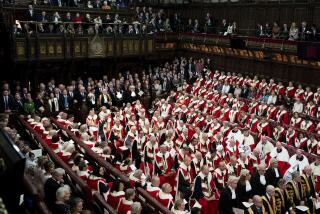Britain’s American Revolution
- Share via
FOR A TIME, it seemed as if the finale of Tony Blair’s premiership would be a reprise of Anthony Eden’s, with an Iraq Fiasco taking the place of a Suez Crisis. Now it appears more likely that the British prime minister will be following in the footsteps of David Lloyd George, who left 10 Downing Street in 1922 under the murky cloud of suspected corruption.
Of the 11 people initially nominated by the Labor Party to become life peers in 2005, four subsequently withdrew their names amid allegations that they were being rewarded for having given the party large loans. Last week, apparently in connection with these strange events, police arrested the prime minister’s friend and tennis partner, Michael Levy, on suspicion of conspiracy to pervert the course of justice.
To Americans, who are charmed by Blair’s Colgate ring-of-confidence smile, there’s something surreal about the news that he has been questioned (for the second time) by the police. Like all great political tragedies, the fault lies not in Blair’s stars but in himself.
Thus far, it is true, the evidence in the public domain is purely circumstantial. We know that since 2001, more than half of all donors giving more than 50,000 pounds -- about $100,000 -- to the Labor Party have received an honor of some kind (including knighthoods and medals). We know that the four individuals who withdrew their nominations for peerages last year had made substantial loans to the Labor Party. And we know that they were advised by Levy to give loans rather than outright gifts. I don’t claim to be a lawyer, but it sounds a lot like the kind of thing the Honors (Prevention of Abuses) Act of 1925 was designed to stop.
Blair might have been spared all this if only he could have made up his mind about two issues. The first was the future composition and mode of election of the upper house of Parliament. The second was the future financing of political parties.
Plainly, there is no point in having two legislative chambers if both are to be elected on the same democratic basis. Having committed themselves to reforming the House of Lords by phasing out the hereditary peerage, Blair and his colleagues had a number of options. They could have imitated the U.S. Senate, in which the interests of smaller and more rural parts of the country are overrepresented at the expense of the larger and more urban parts. But a party so unpopular in the countryside was hardly likely to do that. Instead, they clung to the irresistibly useful old system of giving peerages to their pals.
At the same time, they failed to grasp the nettle of party political finances. The problem here is the same as in all modern democracies. The costs of election campaigns keep rising as voters expect ever-more sophisticated marketing and advertising. However, traditional sources of party revenue, such as membership dues, keep falling as voters turn away from political activism. Labor could have followed the Continental example by financing parties out of taxation through state handouts and imposing stricter caps on private donations and election expenditures. But a party so desperate to win power could not resist the temptation to beat the Conservatives at their old game of tapping millionaires.
Now we see the result: a House of Lords stuffed with cronies, and a government stewing in sleaze.
Yet I find myself a little depressed by the solutions that are being cobbled together. I am not sure it was wise of the Conservatives to so quickly embrace the notion of state funding for parties. And I shall be dismayed if they agree too readily to the government’s latest proposals to reform the House of Lords by making half the members elected, 30% nominated by the parties and the rest appointed by a commission to ensure (it’s hard not to groan) ethnic, gender and regional balance.
A more authentically conservative solution would take quite different forms. For the parties, there should be a completely free market in political donations, but on the basis of full disclosure, so that it’s transparently clear who has given what to whom. As for the House of Lords, why not elect all the members but give equal representation to each of the traditional counties of Britain?
Yes, I know: that would make British politics more like U.S. politics and less like, say, Dutch politics. But frankly, I’d rather see Blair end his days with dignity as the ranking senator for County Durham than doing time for turning Labor’s lenders into Lords.
nferguson@latimescolumnists.com
More to Read
Sign up for Essential California
The most important California stories and recommendations in your inbox every morning.
You may occasionally receive promotional content from the Los Angeles Times.












